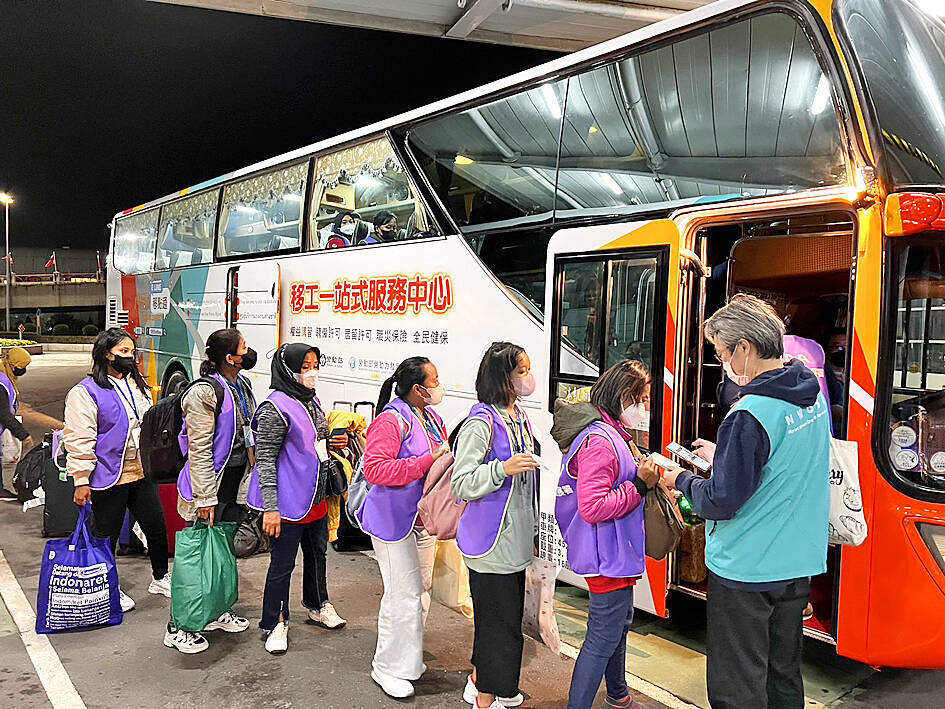Employers would be able to hire more migrant workers after the Ministry of Labor yesterday unveiled proposed regulatory changes aimed at boosting the labor supply in Taiwan by up to 28,000 from the middle of next month.
The policy was developed in collaboration with the Ministry of Agriculture, the Ministry of Health and Welfare and the Ministry of Economic Affairs to deal with labor shortages, the labor ministry said in a public notice for the rule changes.
The public has the duration of the notice, or until Tuesday next week, to provide feedback to the government before the regulations are promulgated, it said.

Photo courtesy of the Ministry of Labor
The amended regulations would allow for 600 additional workers across 210 companies in the manufacturing sector, including 142 at seafood processors, 37 at tofu makers and 31 at metal hull manufacturers, Workforce Development Agency Deputy Director-General Lai Jia-jen (賴家仁) said.
The rule changes target industries with manufacturing processes that are difficult to automate and have hazardous working conditions, authorizing an increase in the share of migrant workers of their workforce to 20 percent from 15 percent previously, Lai said.
To reduce the number of idle migrant workers, manufacturers would receive an additional 5 percent on their quota when they employ eligible candidates who already reside in Taiwan, he said.
The cap for migrant workers across the manufacturing sector would be 40 percent, he said.
The cap for migrant workers at eligible comprehensive construction enterprises, specialized construction enterprises and civil engineering contractors would also be 40 percent, which would add 8,000 to the combined workforce, Lai said.
For example, for a civil engineering contractor to qualify to hire additional migrant workers under the new rules, it would need to have a contract valued at NT$10 million (US$324,739) or more and have more than five Taiwanese workers on its payroll, he said.
Farms that have 10 employees or fewer would be allowed a 50 percent cap on migrant workers, up from 35 percent, but the cap for large farms would remain unchanged, he said.
Agricultural entities allowed to hire migrant workers would include farms cultivating specific kinds of vegetables, fruit-bearing trees, seedlings, flowers, non-rice grains, coffee, tea and greenhouse-grown plants, he said.
In addition, timber harvesting and tree planting entities would be allowed to hire migrant workers, he said.
The agricultural workforce would increase by 12,000 due to the changes, Lai said, adding that the new rules would boost the number of care workers in the nursing sector by 14,000.
The current cap on migrant workers at social welfare institutions is one-third of the total number of occupied beds and the cap at long-term care facilities is one-fifth of the registered total bed capacity, he said.
The new rules would base the cap for all institutions on registered total bed capacity, he said.
Institutions would be allowed to employ as many migrant workers in carer roles as the total number of Taiwanese nurses and carers they employ, instead of only carers as currently stipulated, Lai said.

Tropical Storm Gaemi strengthened into a typhoon at 2pm yesterday, and could make landfall in Yilan County tomorrow, the Central Weather Administration (CWA) said yesterday. The agency was scheduled to issue a sea warning at 11:30pm yesterday, and could issue a land warning later today. Gaemi was moving north-northwest at 4kph, carrying maximum sustained winds near its center of up to 118.8kph and gusts of 154.8kph. The circumference is forecast to reach eastern Taiwan tomorrow morning, with the center making landfall in Yilan County later that night before departing from the north coast, CWA weather forecaster Kuan Shin-ping (官欣平) said yesterday. Uncertainty remains and

SEA WARNING LIKELY: The storm, named Gaemi, could become a moderate typhoon on Wednesday or Thursday, with the Taipei City Government preparing for flooding A tropical depression east of the Philippines developed into a tropical storm named Gaemi at 2pm yesterday, and was moving toward eastern Taiwan, the Central Weather Administration (CWA) said. Gaemi could begin to affect Taiwan proper on Tuesday, lasting until Friday, and could develop into a moderate typhoon on Wednesday or Thursday, it said. A sea warning for Gaemi could be issued as early as Tuesday morning, it added. Gaemi, the third tropical storm in the Pacific Ocean this typhoon season, is projected to begin moving northwest today, and be closest to Taiwan on Wednesday or Thursday, the agency said. Today, there would likely

DISRUPTIONS: The high-speed rail is to operate as normal, while several airlines either canceled flights or announced early departures or late arrivals Schools and offices in 15 cities and counties are to be closed today due to Typhoon Gaemi, local governments announced last night. The 15 are: Taipei, New Taipei City, Taoyuan, Tainan, Keelung, Hsinchu and Kaohsiung, as well as Yilan, Hualien, Hsinchu, Miaoli, Chiayi, Pingtung, Penghu and Lienchiang counties. People should brace for torrential rainfall brought by the storm, with its center forecast to make landfall on the east coast between tonight and tomorrow morning, the Central Weather Administration (CWA) said. The agency issued a sea warning for the typhoon at 11:30pm on Monday, followed by a land warning at 11:30am yesterday. As of

CASUALTY: A 70-year-old woman was killed by a falling tree in Kaohsiung as the premier warned all government agencies to remain on high alert for the next 24 hours Schools and offices nationwide are to be closed for a second day today as Typhoon Gaemi crosses over the nation, bringing torrential rain and whipping winds. Gaemi was forecast to make landfall late last night. From Tuesday night, its outer band brought substantial rainfall and strong winds to the nation. As of 6:15pm last night, the typhoon’s center was 20km southeast of Hualien County, Central Weather Administration (CWA) data showed. It was moving at 19kph and had a radius of 250km. As of 3pm yesterday, one woman had died, while 58 people were injured, the Central Emergency Operation Center said. The 70-year-old